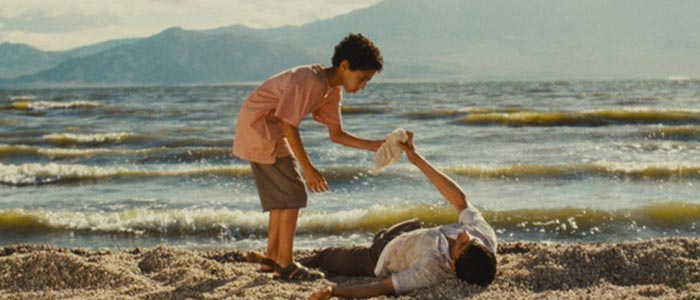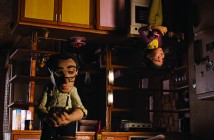
 The 2012 Heartland Film Festival is underway. We thought we’d step back a year and collect some insight from Julian Higgins, director of the Vision Award for Best Short Film winner, “Thief“.
The 2012 Heartland Film Festival is underway. We thought we’d step back a year and collect some insight from Julian Higgins, director of the Vision Award for Best Short Film winner, “Thief“.
Julian Higgins is a Los Angeles-based writer and director. Originally from New Hampshire, he received a BFA in Film from Emerson College and an MFA in Directing from the world-famous American Film Institute.
His AFI thesis film, “Thief” – inspired by little-known events in the early life of Saddam Hussein – won the Narrative Gold Medal at the 2011 Student Academy Awards, as well as Best Drama and Best Director honors at the 2011 Student Emmy Awards. “Thief” also won the AFI’s Franklin J. Schaffner Fellow Award, the Vision Award for Best Short Film at the 2011 Heartland Film Festival, the Angelus Film Festival’s Triumph of the Spirit Award and 22 other prizes. The film is currently playing festivals internationally.
On the strength of the film, Emmy-winning producer-director Greg Yaitanes invited Julian to shadow him during the final season of the acclaimed television drama series “House”. Julian directed episode #15 of the season, which aired on April 2, 2012. In order to direct the episode, Julian used his 2011 Heartland Film Festival prize money toward his Directors Guild of America fees.
Follow @filmjulian on Twitter and check out julianh.com/
Heartland: What are some films you consider to be truly moving pictures?
Julian Higgins: Let me start by saying that I absolutely believe movies can change our lives. Not every movie does, of course, but it’s possible. Art is about change. Great films make you consider your own world in a new way, make you feel something new, make you see things in a new light… effectively, they make you into a new person. So for me, calling a film “truly moving” is a very good choice of words: you go into the theater one way and you come out changed. You can’t ever go back to the way you were before. Ironically, when movies deal with the darkness of the world and life’s most difficult struggles, they can make us feel so full of hope. In that vein, The Diving Bell and the Butterfly is one of the most truly moving films I’ve ever seen. It’s astonishing that a story about a tragically paralyzed man can also be a story about the pure joy of being alive. It’s a beautiful piece of work, and a real inspiration to me as a filmmaker.

Heartland: What have your experiences winning at Heartland and other festivals taught you about being a director?
We took a lot of risks making the film, and even though the subject matter is very foreign, the process of creating it was a personal and organic one. So it was an incredible validation to see how well the film was received. I think “Thief” was a very full and honest expression of my voice as a filmmaker – that’s exactly the kind of work I hope to make throughout my career. I’m still a young director and there is still so much for me to learn, but now I can push forward confidently now that I’ve learned there’s an enthusiastic audience for the kind of stories I want to tell. That is priceless.
Heartland: What values are most important for you to express when writing or directing?
Julian Higgins: There are definitely issues I care a lot about, that motivate me to communicate with people through film. But I hardly ever start there. Movies are an emotional and visual art form – if I wanted to write an op-ed, I would (and it’d be a lot cheaper, too). The challenge is to take the audience on an emotional journey that leads them to meaning – not just to TELL them something you think is true, but to make them FEEL something truthful. I think when people watch “Thief”, they come out of it feeling that it’s possible to make a difference in our world, no matter how marginalized and insignificant we feel. That sounds really corny, right? But if the story works the way it’s supposed to work, the film doesn’t have to spell it out. The audience simply feels it, because they’ve been on that journey with the character. And the interesting part is: I’ve been on the journey too, in writing the story. I started with a character feeling an incredible helplessness and nihilism about his own life, and I tried to honestly examine how that might change. I didn’t know where it was going to take me. Two years later, I had made “Thief”.

Heartland: What influences your style of directing?
Julian Higgins: Long before I started making movies, I wanted to be an actor – I’d say from about second grade onwards that was my main pursuit. As a kid I took all the available drama classes, I did all the school plays through middle school and high school, I took college-level classes as a high school senior… Even when I went to Emerson College as a film major, I still did all the plays and took all the acting classes I possibly could. I think that experience was absolutely essential in forming the way I direct now. For one thing, I love working with actors – I love the process of figuring out what each actor needs from me and from the creative environment in order to do their best. I’ve been in the same position and I understand the challenges of giving a performance, so I think I’m really sensitive to their needs. But I’m also drawn to the same material as a filmmaker that I would be drawn to as an actor: really juicy, specific characters in fascinating, unusual settings – material that you can really immerse yourself in and learn from.
Heartland: If you could work with any actor, who would it be and why?
Julian Higgins: Such a difficult question – there are just so many excellent actors that any director would kill to work with. I’m talking about the Meryl Streeps and Al Pacinos of the world. Those guys are the stuff of dreams. One thing I do think about, though, is that as a young director, it’s really exciting to work with my contemporaries… younger performers who have a ton of potential but haven’t yet had the chance to really show what they can do. It’s inspiring to look at how Scorcese and DeNiro grew up together, or Kurosawa and Mifune, for example. It would be awesome to find some actors and actresses to be creative partners with as our careers develop.

Heartland: When you sit down to watch a film, either in a theater or at home, is there anything in particular you look for besides straight entertainment?
Julian Higgins: I am so sick of big fat movies with no substance. It’s not enough any more, especially when we all have so many options of what to watch. When I go to a movie, I want to feel that the story NEEDS to be told, and doesn’t just satisfy a corporate business plan. I want to see films that engage my emotions and my brain, that have something to say. I want to be exposed to ideas that last longer than two hours. And I want to feel there’s a confident filmmaker behind the film, taking me through the story visually and dramatically, someone making strong choices about how the story is told, a storyteller with something to say. This is not to say that every movie has to be revolutionary – sometimes the smallest canvas is the best way to access the most profound emotions and ideas. But movies should be made with passion. Period. If I can’t feel that passion behind it, I don’t want to see it.
Heartland: If you had the opportunity to teach or mentor an aspiring filmmaker, what would you hope to instill in him or her?
Julian Higgins: I think the most important goal a young filmmaker can have is the development of his or her own unique voice. We all start out trying to imitate the movies and genres we love. But you’ve got to explore different ways of seeing, develop your own sense of style, train your instincts, so that eventually you start making work that is instantly recognizable as being yours and yours alone. It takes a conscious effort and a lot of time. It doesn’t happen unless you practice and experiment and make mistakes. The other thing I’ll say is that in my observation and experience it is totally pointless to try to cater to the marketplace. You have to do the projects you’re passionate about, even if they aren’t what you’d expect to be commercial. You can’t be successful at all unless you’re true to yourself. You only live once.

Heartland: What do you think sets “Thief” apart from short films in the same genre?
Julian Higgins: I saw a lot of short films this year at film festivals all over the country, and I was awestruck by the diversity of content, form, and style. One need only look at the Heartland program every year to see that truly moving films come in every flavor under the sun. We did a couple things with “Thief” that I think may have helped it stick with people. First of all, we really tried to give the movie a sense of scale and scope. I don’t believe that just because a movie is low-budget means it has to be small. We tried to pick locations where we could get really huge exterior wide shots, and tried to show as much landscape and depth as possible. You can’t overstate the importance of wide shots – they are essential in helping the world of the movie feel real. Two of our big visual references were There Will Be Blood and Lawrence of Arabia – movies that feel enormous largely because of the camerawork. Another thing we did was try to let the movie breath. Even if it was only 25 minutes, we wanted it to have the pace of a feature. That was a fine line to walk – I’m sure some people find the movie slow, and some of our earlier cuts were downright boring – but I think it helps the payoff of the story because when you get there you’ve really been through a lot with this character and you’re really invested in what happens to him. Or at least, I hope people feel that way! Anyway, good pacing helps the audience get invested in the character.
Heartland: What is the next step for you?
Julian Higgins: I’m currently adapting a novel for film. It’s the kind of story I love –character-driven, a great showcase for an ensemble of actors, very moving and emotional but also goes to the dark places and moral gray areas. It really feels like me, and just want to work on it all the time. Filmmakers know that’s a rare and wonderful feeling. In addition, in April I made my small-screen debut with an episode of HOUSE – a truly phenomenal experience – and I’m really enthusiastic about continuing to work in the television world as well. It’s a great space for directors, not only because so many great actors are coming to TV from the feature world, but also because there is so much good storytelling on television. There’s consistently better writing, directing, and performing on, for example, AMC or Showtime, than in the vast majority of mainstream feature films. I’m starting to feel that if you want to make character-driven drama with great actors and serious budgets, television is the place to be.
Thanks to Julian for the interview.




